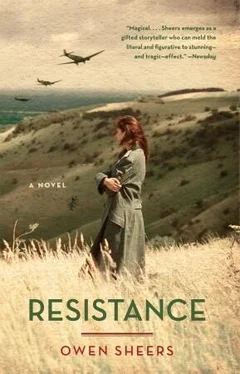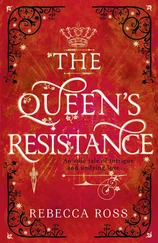That evening the clouds cleared and Sarah was able to stand at the back of Upper Blaen and look down the simplified valley, illuminated under moonlight. The snow-thickened ground had risen within feet of the trees’ lower branches. The trees themselves wore a foliage of frost and half a foot of white on every limb. Every hedge and every fence was covered, their presence reduced to long undulations like the banks and ridges of Tom’s body carved into the horsehair mattress by the weight of his sleeping.
For two months now the women had lived alone. It had been a gradual shedding of company. First, at the outbreak of war, the sons and farmhands had left, drawn from the valley by the faraway conflict. Then, years later, their husbands had followed, swallowed overnight by the hills. Now, with the advance of the German army, what few visitors to the valley there ever had been had stopped coming. Reverend Davies, the Baptist minister who held their fortnightly services at The Court, the doctor, the district nurse, the blacksmith. Even the Ministry men with their clipboards and pamphlets. Finally, Maggie’s radio, their one intermittent contact with the outside world, had been defeated. Maggie still switched it on, but only to hear it tune hopelessly through static, listening to nothing but the white noise of its silence.
No road had ever run through the Olchon, and now it was as if no road had ever run into it either. Absorbed in their work, in thoughts of their husbands, the women had become amputated from the world beyond. It was as if it had forgotten they ever existed. And now the snow had perfected their isolation. If the silence, the absence of their situation, could have been made corporeal, it would have looked like this. A thick shroud over the fields, the farms, the river. A great white dust sheet laid over the entire contents of a locked and abandoned house.
And yet they were not alone, as Maggie proved in more ways than one when she came knocking at Upper Blaen later that evening. Sarah had been expecting her. She knew she’d come in the end, Maggie always did. She also knew that she should have gone down to see Maggie first. That she shouldn’t have let the older woman struggle up through the snow to Upper Blaen. And she would have gone too, if she hadn’t had to take hay to the sheep, smash the ice in the troughs, settle the two ewes in the shed, dig a hole over the submerged hen house and lean over it to listen for the warm, buried clucking of the hens as she tipped in their feed. Even then Sarah would have gone to see Maggie, but only if she hadn’t spent so much time sitting in the kitchen watching the snow fall and fall and fall, wondering whether to curse or bless its coming. Only if she hadn’t sat for an hour beside the fire staring at her wedding photograph, aching her brain trying to remember what Tom felt like, smelt like, sounded like. Trying to remember what it was to love him as him, and not as her missing husband. Trying to remember what it was to love him at all. Because her anger had not subsided with the cold in her fingers. She still didn’t understand. How a man could leave his wife to all this; to the war, to those soldiers, to herself for so long.
And then the sharp pangs of guilt and worry. Perhaps Tom had no power over his missing. What if he was lying months dead in the hills or, worse she somehow thought, languishing in a German camp somewhere on the continent? She just didn’t know. And it was killing her. All she did know was this. The falling snow. The glowing and cracking coals. The wind, funnelling down the chute of the valley. The simple smells, sounds, lives, and deaths of her animals. And, of course, Maggie and the others, all enduring their own versions of this left-behind limbo. Each so unique and yet so much the same.
When Maggie came through the door her face was red with effort and cold. She sat by the range, unwrapping herself and stamping her boots, dislodging threads of snow from their treads.
“Well, better this than a green one, bach,” she said, massaging her hands back to life. “Tha’s all I can say. Better than a green one.”
A green winter. Sarah’s mother had always had the same fear. A winter without snow. It was bad luck. The old people would die. Maggie was the oldest in the valley.
Sarah looked out at the Hatterall ridge, a dark curve between the stars and the snow-plump fields. “No, Maggie,” she said. “I think you’ll be safe with this one.”
Maggie looked up at her and Sarah saw the uncertainty moving under the old woman’s features, like a submerged brook running under fragile ground. The soldiers had come to her too. Or at least one of them had.
“I didn’t know what to do when he held out that note,” Maggie said, warming her hands on a mug and studying the still-swirling tea within. “ ‘Medic,’ he kept sayin’. ‘Medic.’ Well, I thought he wanted one, not that he was one. But then I read the note, see. ‘OK,’ I says, ‘well, follow me then, Medic.’ ” Maggie looked up from the mug. “An’ he was good as gold after that.”
Between them Maggie and Sebald had freed her lambing ewes from an upper field and brought them down to the meadows beside the farmhouse. Then Sebald had cleared the snow from her front door and path and carried bushels of hay to the sheep. Maggie spoke no German and Sebald no English, but Maggie recognised the language of hard work and was quietly grateful for his assistance.
“And what about Menna and Mary?” Sarah asked.
“Oh, they’re fine,” Maggie said. “Another couple of the Germans went to them as well. Only thing is they must have seen Bethan, I s’pose.”
“And have you seen them, then?” Sarah knew there was no way Maggie could have battled her way over to the other side of the valley through this much snow, but she needed to believe that somehow she had.
“No,” Maggie said, looking back down into her tea. “No, I haven’t seen them myself, but I know they’re all right. The captain told me.”
“He came to see you?” Sarah had known he would. That he wouldn’t leave them alone anymore.
“Yes.”
“An’ you believe him, do you, Maggie? That they’re safe?”
Maggie met Sarah’s stare. “Yes,” she said, “I do, Sarah. Why would he lie to me?”
Ever since that first morning meeting, Maggie had felt instinctively that she and Albrecht understood each other; that there was an echo in their positions, their situations, which was slight but still significant.
Sarah knelt to the fire and stoked the hot coals, releasing a breath of sparks from their breaking hearts. “He knows,” she said, looking into the flames. “He knows, Maggie. About Tom. And the others.”
She couldn’t look the old woman in the face, but she heard Maggie sigh behind her.
“Yes, bach,” Maggie said, “I know he does. He told me too.”
Sarah sat back down opposite her. The night outside was still and quiet after the hours of endless wind. The temperature was dropping. Sarah was sure she could hear the ice forming over the house, crystal by crystal. “So what do we do now?” she asked.
Maggie took a gulp of her tea and stared into the broken coals and glowing embers.
“Oh, nothing for now, bach,” she said. “Not while it’s like this.” She carried on staring into the fire, a glaze forming over her eyes. “Nothing ’til the snow’s cleared. ’Til then I reckon we’ll need them as much we can.”
That night Sarah couldn’t sleep, her mind restless between the memories of two men no longer with her: Tom, her missing husband, and the poet she’d once known as a girl. Sarah hadn’t thought of the poet for years. Every now and then after he and his colleagues had left the old monastery, they’d been mentioned in whispered tones by her mother and father. Soon, however, they were not, and the poet became no more than a faint summer memory, surfacing just once again in the month she’d left school when she was fourteen years old. Mrs. Thomas, her teacher, had also known about the poet. She’d never met him, although she’d met the others living up at the old monastery, the artist and his daughters. When she discovered Sarah had seen the poet, and even spoken to him, she’d sat her down and questioned her about the time they’d spent together. Sarah had answered her as best she could. It seemed the poet, a man called David Jones, was also a famous artist, and this was why Mrs. Thomas was so interested. He’d recently had an exhibition of his paintings in London. Mrs. Thomas showed Sarah a newspaper cutting, a review of this exhibition. Because of this review, this exhibition, the questions were very important to Mrs. Thomas. She wanted to know everything Sarah knew about the poet. It was as if, just briefly, Sarah was the teacher and she was the pupil. Mrs. Thomas had promised to show Sarah a book with some of the poet’s work in it, but when she’d left Llanthony shortly after Sarah had finished school, she took her talk of the poet with her, so as Sarah grew older she’d left him and his stories behind her. But now, with the wild scattering of her mind, with the German captain’s questions, with his mention of a poet of his own, and most strange of all, with her memory of those diagrams from “The Countryman’s Diary,” she had thought of him again. And now she couldn’t not think of him.
Читать дальше












